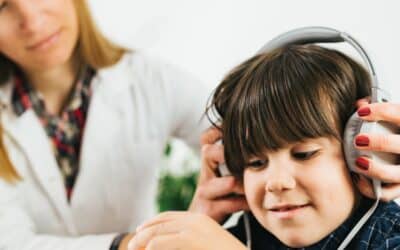Ear infections, also called acute otitis media, is a common childhood ailment. In this article, we will explain, “What are Childhood Ear Infections?” We will share essential information about ear infections, their causes, symptoms, treatments, and preventive measures, along with their impact on speech and language development. This article is not a substitute for first-hand medical care.
Understanding Ear Infections
What Are Ear Infections?
An ear infection is an inflammation of the middle ear, typically caused by bacteria or viruses. These infections often follow other illnesses like colds or allergies.
Why Do Ear Infections Occur More Often in Children?
The anatomy of a child’s ear contributes significantly to the frequency of ear infections. The Eustachian tube, which connects the middle ear to the throat and helps with fluid drainage and air pressure regulation, is smaller and more horizontal in children. This design makes it easier for fluid to get trapped and infected, leading to an ear infection.

Identifying Symptoms
Recognizing the signs of an ear infection is crucial for timely intervention.
Physical Symptoms
- Ear pain, often worsening when lying down
- Trouble sleeping
- Irritability, fussiness, and increased crying
- Difficulty hearing or responding to sounds
- Fever
- Fluid drainage: Ranging from clear fluid to pus or even bloody discharge.
- Hearing difficulties: May lead to a hearing loss and a child frequently asking for louder volume or seeming inattentive to sounds.
- Tugging or pulling at the ear: Common in younger children and infants.
Behavioral Symptoms
- Loss of appetite: Possibly due to pain during chewing.
- Difficulty paying attention: Children may seem more distracted than usual.
- Delayed response or no response when spoken to: Often mistaken for inattentiveness or disregard.
- Frequently saying, “huh,” or asking for repetition: Indicating trouble hearing.
- Not following directions: Which might be mistaken for defiance or misbehavior.
- Turning up the television or other device volume: Beyond usual listening levels.
- Withdrawing from social situations: Due to difficulty hearing or feeling out of place.
- Over-activity: As a means to compensate or distract from their discomfort.
- Being uncooperative: Which can often be misinterpreted as stubbornness or naughty behavior.

What If You Suspect Your Child has an Ear Infection?
- Observe and Record Symptoms: Monitor the child’s symptoms, noting their severity and duration.
- Consult a Healthcare Provider: If symptoms persist or worsen, seek medical advice. A healthcare provider can accurately diagnose an ear infection and recommend appropriate treatment.
- Follow Treatment Recommendations: Treatment may include pain management, antibiotics (for bacterial infections), or in chronic cases, surgical intervention.
The Impact of Ear Infections on Speech-Language Development
Ear infections can significantly affect a child’s speech and language development. Conductive hearing loss due to fluid or infection in the middle ear can hinder a child’s ability to hear and process sounds and words correctly. This impairment can lead to delays in speech and language acquisition.
Preventive Measures
To reduce the risk of ear infections:
- Avoid Bottle-feeding While Lying Down: This can cause fluid to flow into the Eustachian tube.
- Encourage Good Hygiene: Teach children proper handwashing to prevent infections.
- Breastfeed When Possible: Breastfeeding has been shown to offer protection against ear infections.
- Maintain Proper Feeding Postures: Keep the child upright during bottle-feeding.
- Stay Up to Date on Vaccinations: Vaccines can prevent illnesses that lead to ear infections.
FAQs
- How can I prevent my child from getting ear infections?
- Practice good hygiene, ensure proper feeding techniques, and keep vaccinations up to date.
- Are ear infections a cause for concern?
- While common, ear infections should not be overlooked. If you have concerns, have your child assessed by their healthcare provider.
- Can ear infections affect my child’s hearing permanently?
- Frequent or untreated infections can lead to permanent hearing loss.
- What should I do if my child shows symptoms of an ear infection?
- Monitor the symptoms and consult their healthcare provider for an accurate diagnosis and treatment plan.
- How do ear infections impact speech and language development?
- Hearing loss from infections can delay speech and language development, affecting learning and communication. In such cases, contact a speech-language pathologist.
Additional Resources
For further information and guidance, parents can refer to these reliable sources:
- Ear Infections in Children, Babies & Toddlers | NIDCD (nih.gov)
- Ear Infection (Otitis Media): Symptoms, Causes & Treatment (clevelandclinic.org)
- Ear Infections in Babies and Toddlers | Johns Hopkins Medicine
- Ear Infections (Otitis Media) (asha.org)
Summary/Conclusion
Ear infections also known as acute otitis media affects millions of children each year. It is a condition that occurs when the middle ear becomes infected and inflamed, leading to a buildup of fluid behind the eardrum. This fluid buildup can cause pain, pressure, and hearing loss in affected children. Ear infections in children are a significant health concern, with potential long-term effects on hearing and speech development. Early recognition, appropriate medical intervention, and preventive measures are key to managing their impact, ensuring a healthier growth and development trajectory for your child.




0 Comments